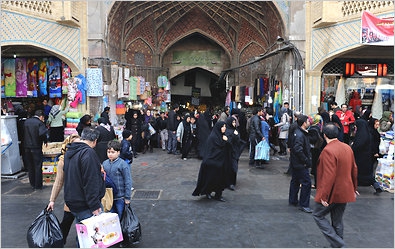Wednesday 10 October 2012 - 13:10
Story Code : 7317
Iran sanctions: the case for humanitarian waivers
The riots that have exploded in Tehran as the result of the collapse of the Iranian currency are a reminder of the suffering borne by ordinary Iranians from the crushing sanctions imposed on the country. However, we should not only ask if these sanctions are effective in achieving their stated aim, but also question them from a humanitarian point of view.
Iran has been under some form of U.S. sanctions since the hostage crisis of 1979. About 20 years ago, in my banking career, I was talking to a Treasury official about the impact of some of these sanctions on the average Iranian. As an example, I stated that the lack of spare parts for civilian aircraft was creating a danger for Iranians flying on the national airline, and could lead to deadly crashes. His blunt answer was that it was exactly the intent. It seems to me that the American political class has adopted a similar attitude today.
The crippling sanctions have paralyzed the Iranian economy, but have yet to achieve their stated aim, which is to force the Iranian regime to abandon its nuclear program. They may never achieve that aim, since the Iranian leaders have no compunction in increasing the hardships of a population already subject to the brutal repression of a harsh theocracy. Historically, broad economic sanctions have rarely worked, especially when the targeted country can rely on an autonomous income source such as oil.
What they have done is to led to mass unemployment and the impoverishment of the average Iranian family, who cannot afford basic foods and needed drugs. In addition, they have led to dangerous shortages of drugs and medical equipment. In fact, the drug shortage is so drastic that scores of severely ill people, cancer patients, hemophiliacs and countless others are in mortal danger. The problem here is not with actual prohibitions on these items, which benefit from a waiver, but the financial sanctions, which prevent Iranians from paying for their importation. Once again, we are not talking about the regime's elites, but the ordinary people. Sick people and children are particularly at risk. If the West thinks for a moment that the dire healthcare situation will force the regime to succumb to the pressures of the sanctions in order to help the average Iranian, it should think again.
These sanctions have also had the effect of gradually turning the Iranian people against the United State. Iranians have traditionally been pro-West and pro-U.S., and in fact are the most pro-American population in the Middle East. Let us remember that the Iranians were some of the only people in the Middle East who held candlelight vigils and bowed their heads in sorrow for the victims of 9/11. Poll after poll has shown that Iranians admire the United States, and the country is the preferred destination for higher education. Moreover, the large Iranian Diaspora in the United States, numbering in the hundreds of thousands, is another testament of this enduring friendship. While the people blame their own regime for the economic chaos, they are increasingly blaming the United State for their day-to-day suffering.
Sanctions can be an important tool of diplomacy, as long as they target their intended adversaries. The adversary here is not the Iranian nation, but its government. We understand that it is difficult to make the right choices on the eve of a bitterly fought election, with intense pressure from some right-wing political circles. However, there are ways to immediately alleviate the pressures on the average Iranians by easing the sanctions on humanitarian goods, in particular drugs and essential medical devices. As I mentioned before, existing waivers are not sufficient, because the real problem is the financing of trade. The U.S. and European governments could resolve any concerns about the misuse of such waivers by channeling these items through recognized international humanitarian organizations. In the long term, the friendship of the Iranian people will be a great asset for the United States and the West. Such action would be a big step in helping the Iranian people and an even bigger one in repairing the West's fraying people-to-people relations.
The Iran Project is not responsible for the content of quoted articles.
# Tags











